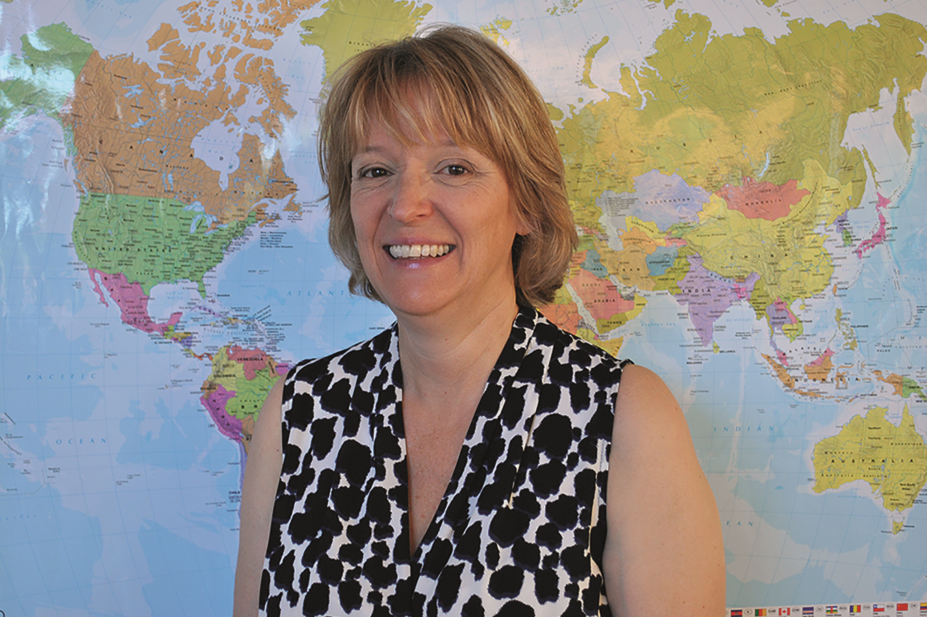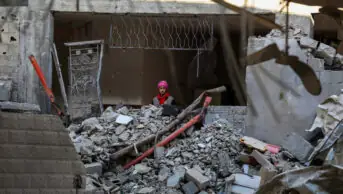
Courtesy of Sarah Marshall
Sarah Marshall is a teaching fellow in global health and course leader for the newly launched Global Pharmacy MSc at Brighton and Sussex Medical School (BSMS). The course programme is designed for pharmacists and pharmaceutical scientists who are interested in improving health worldwide.
What is your current role and how did you get here?
I began working at the Wellcome Trust Centre for Global Health Research at BSMS in 2014. However, my journey has been a rather convoluted one! I became interested in pharmacy and global health as a student at Brighton and this led me to do a PhD investigating traditional plant remedies as sources of novel antimalarials. I seemed to always end up doing two jobs at once, so was working as a locum hospital pharmacist at the same time. My marriage to a geologist gave me the opportunity to practise in Oman and the Netherlands in community pharmacy and academia, and as a clinical trials pharmacist in a large university hospital. When we moved back to the UK, I taught on the MPharm at Robert Gordon University. The joy of what I am doing now is being able to build on the experience acquired over those years to do something innovative.
Where does your passion for global health, in particular the role pharmacy can play, stem from?
Two billion people — a third of the world’s population — don’t have access to the most basic medicines. As a pharmacist that troubles me deeply. The heart of our profession is making sure that people have access to the right medicines, of the right quality, in the right dose, at the right time and for the right duration. Global access to medicines focuses on discovery and development of affordable medicines, distribution and supply, ensuring rational use of good quality medicines, and the extended roles that pharmacists play on an increasing scale.
While there are some aspects of global access to medicines and achieving universal health coverage that are outside our control, there are urgent global health issues, such as emerging resistance to antibiotics and antitretrovirals that our training makes us eminently suited to tackle. We (as pharmacists), have so much to offer!
Why did you develop the new programme in global pharmacy?
Although it might seem unusual for a medical school to offer a course in global pharmacy, to us it makes perfect sense. BSMS is a partnership between the Universities of Brighton and Sussex, both of which have successful MPharm courses and there are existing strong teaching and research links. Our department earned Wellcome Trust status for pioneering research into neglected tropical diseases, antibiotic resistance and tuberculosis, and is home to a popular MSc in Global Health. We have links with global pharmacy organisations and work with our parent universities and the local trust on projects such as the Brighton-Lusaka Health Link, exchanging knowledge and experience with pharmacists in Zambia. So the Global Pharmacy course seemed an ideal opportunity to draw all this expertise together.
What obstacles have you encountered during your career and how have you overcome them?
Living and working in Oman and the Netherlands for nine years was a privilege, but it was challenging in the beginning to adapt to a new country, language, culture and climate, as well as varying professional roles. I was fortunate to be able to find local pharmacist mentors who helped me navigate the complexities of registration and pharmacy practice in different countries. I found depths of resourcefulness and resilience I didn’t know I had, as well as determination to practise my profession wherever we were. I also gained invaluable experience of various aspects of pharmacy around the world.
What is it about your role that makes you proud to be a pharmacist?
I love the breadth that pharmacy entails, and I have had the chance to witness this throughout my career practising in various countries. I have met inspirational pharmacists from all over the world. What impresses me is the professionalism and compassion with which colleagues go about their practice, always striving to achieve the best for their patients, whether that is community pharmacists in Argentina seeking to prevent the spread of Zika virus, hospital pharmacists in Zambia improving antibiotic stewardship, or humanitarian pharmacists in Yemen or in refugee camps in Uganda. We can learn so much from each other. We are the experts in medicines and wherever there are medicines there should be pharmacists, globally! It is also really encouraging to see examples of innovative thinking in industrial pharmacy, such as the use of mobile technology to improve the supply chain for critical medicines in low-income countries. This has so much potential to impact global health.
What does the pharmacy profession of the future look like to you and how does it differ from the profession today?
Many countries rely on community health workers and unaccredited drug shops to get medicines to remote or rural populations. These shops may be staffed by unqualified people or nurses, which raises the issues of governance as well as taking nurses away from the role for which they have been trained. Sadly, the pharmacy workforce is smallest where the burden of disease is greatest. A recent UNICEF study found that there were five pharmacists in the public sector in Malawi, serving 17 million people, where the top three causes of death are HIV/AIDS, pneumonia and malaria: deaths which could be prevented with reliable supplies of good quality medicines which are used appropriately. The pharmacy workforce is an investment not a cost! I want to see pharmacists acknowledged as the experts in medicines globally and playing a vital part in delivering universal health coverage worldwide.
However, you don’t have to leave the UK to improve global health. I would like more UK-based pharmacists to look at supporting colleagues in low income countries. That could be through joining global pharmacy organisations such as The International Pharmaceutical Federation’s (FIP) Pharmabridge programme, The Commonwealth Pharmacists’ Association (CPA) or the RPS Humanitarian Aid and Response Network (HARN). Another option is to set up a Tropical Health and Education Trust partnership to share knowledge and expertise. Our experience has been that such links benefit everyone involved.
What advice would you give to pre-registration pharmacists wishing to pursue a similar career?
If you want to work internationally, you need to get as much experience as possible in the UK first, and preferably learn at least one other language. You also have to be flexible, persistent, determined and prepared to take risks, as well as accept that systems abroad are different.
For those interested in pharmacy and global health, I would suggest joining organisations such as FIP, CPA or HARN. It is also really important to stay informed about global health developments. One easy way to do this is to follow key global health actors on social media, such as WHO, UNICEF, Médecins Sans Frontières, FIP and Health Action International and follow up what interests you. The daily email news feed from Global Health NOW is also very useful.

